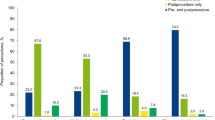Abstract
Data sources
Medline provided the primary data source with references from identified articles being reviewed for additional studies. The Cochrane Collaboration database was also searched and a search performed of cited references.
Study selection
Clinical studies, in English, examining perioperative management of patients receiving long-term oral anticoagulant (OAC) therapy were selected.
Data extraction and synthesis
Data were extracted regarding management strategy, thrombo-embolic events and bleeding complications, and type of surgical or invasive procedure. Event rates were reported as number of patients experiencing the event divided by number of patients at risk. Binomial and Poisson distributions were used to calculate 95% confidence intervals (CI).
Results
A total of 31 reports were identified and concluded to be of generally poor quality. For studies reporting thrombo-embolic events, 29 events occurred in 1868 patients (1.6%; 95% CI, 1.0–2.1) of which seven were strokes (0.4%; 95% CI, 0.0–0.7). Major bleeding while receiving OAC was reported to be rare for dental procedures (occurring in four out of 2014 individuals), arthrocentesis (in none out of 32), cataract surgery (none out of 203), and upper endoscopy or colonoscopy with or without biopsy (no occurrences in 111 patients). For the other invasive and surgical procedures reviewed, OAC needs to be withheld and a suitable personalised perioperative management strategy instigated. A guideline, based on the limited evidence available, for the perioperative management of anticoagulation for procedures requiring discontinuation of OAC is presented.
Conclusions
Certain surgical or invasive procedures can be undertaken in patients who are taking OAC therapy without alteration of their regimen. For procedures requiring discontinuation of OAC, personalised management strategies are required. More rigorous studies are needed to better inform this debate.
Similar content being viewed by others
Commentary
This review examined 31 reports relating to invasive procedures in a number of disciplines. A small number of these reports documented oral surgery, whereas others covered procedures ranging from cataract surgery, cardiac catheterisation, gastrointestinal endoscopy to treatment of genitourinary conditions.
The quality of the reports was considered to be poor in general. A lack of separation of minor from major procedures was acknowledged to make the interpretation of postoperative problems difficult. In one report that included over 2000 procedures with continuation of OAC, 12 cases (0.6%) were recorded as suffering serious bleeding. Again, definition of serious compared with minor bleeding was not clarified. Another report, in which OAC were withheld in a group of over 500 cases, reported two thrombo-embolic events.
In two more recent studies, including over 100 cases, little difference was recorded in outcomes when OAC were withheld, with or without substitution with heparin regimes. A higher than expected observed rate of thrombo-embolic events and strokes associated with various forms of surgery was noted in these two studies. Theoretical causative factors such as rebound hypercoagulability and a thrombotic state induced by surgery were discussed but other possible factors, such as the effects of drugs (eg, antibiotics and analgesics) and of change of diet, were not.
If it is accepted that only minor surgery is being performed in dental practice, the relevance of this paper to general dental practitioners is limited. Perhaps its significance is that it highlights the possibly grave consequences of a thrombo embolic event compared with the consequence of even a serious postoperative bleed. Therefore if planning a minor surgical procedure in a patient with a mechanical mitral valve, who is maintained at the higher INR (international normalized ratio) level withholding OAC is not warranted unless it is required on medical grounds (to maintain them in their target/therapeutic range). Ironically, the lower-target patients, such as the atrial fibrillation group, who are less likely to bleed, can have their OAC stopped with little consequence. This paper produces no evidence to support the use of regimens of heparin to substitute for perioperatively withheld OAC in minor surgical procedures.
Practice points
-
Dental surgery including minor oral surgical procedures should be performed without alteration of OAC.
-
Heparin substituting for OAC withheld perioperatively in minor oral surgery is not supported at the present time.
Author information
Authors and Affiliations
Additional information
Address for correspondence: AS Dunn, Department of Medicine, Mount Sinai School of Medicine, New York NY 10029, USA. E-mail: andrew.dunn@mountsinai.org
Dunn AS, Turpie AG. Perioperative management of patients receiving oral anticoagulants: a systematic review. Arch Intern Med 2003; 163:901–908
Rights and permissions
About this article
Cite this article
Malden, N. Dental procedures can be undertaken without alteration of oral anticoagulant regimen. Evid Based Dent 6, 11 (2005). https://doi.org/10.1038/sj.ebd.6400309
Published:
Issue Date:
DOI: https://doi.org/10.1038/sj.ebd.6400309
This article is cited by
-
Usefulness of platelet-rich fibrin as a hemostatic agent after dental extractions in patients receiving anticoagulant therapy with factor Xa inhibitors: a case series
Oral and Maxillofacial Surgery (2019)
-
Managing patients taking novel oral anticoagulants (NOAs) in dentistry: a discussion paper on clinical implications
BMC Oral Health (2016)
-
Should we stop oral anticoagulants in the surgical treatment of carpal tunnel syndrome?
HAND (2012)



